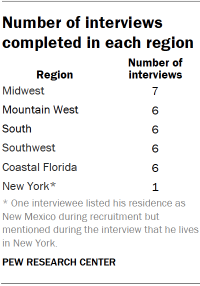Pew Research Center completed a series of individual in-depth interviews from May 15 to May 26, 2023. A total of 32 interviews were held to explore the views of adults who see addressing climate change as a lower priority for the United States and do not believe the Earth is getting warmer mainly because of human activity. Each interview was held online for approximately 30 minutes. Additional survey findings were included in this report; the survey methodology can be found here.
Interview recruitment
Center researchers developed recruitment guidelines in consultation with Sago, a market research firm. Sago recruited adults to participate in the interviews through their national database. To be included, potential interviewees had to be adults ages 18 to 59 living in one of five designated regions of the U.S.
People were eligible for inclusion in the study based on their responses to questions that asked about views of climate change. Potential interviewees were asked, “Thinking about all the issues and problems the federal government could address, how much of a priority do you think dealing with global climate change should be?” Those who gave a response of less than “A top priority” continued in the screener process.
Potential interviewees were also asked, “From what you’ve read or heard, is there solid evidence that the average temperature on Earth has been getting warmer over the past few decades, or not?” Those who responded “No” moved forward.
Those who responded “Yes” were asked which of these three statements about the Earth’s temperature came closest to their view: The Earth is getting warmer mostly because of human activity such as burning fossil fuels, the Earth is getting warmer mostly because of natural patterns in the Earth’s environment, the Earth is getting warmer because of an equal mix of human activity and natural patterns in the Earth’s environment, or if they were not sure. Those who responded that the Earth is getting warmer mostly due to natural patterns, or due to an equal mix of human activity and natural patterns, moved forward in the screener process.
Potential interviewees were then asked how much they had heard or read about issues related to climate and the environment. Those who responded “a lot” or “a little” and met previous criteria were eligible for the study.
Five geographic regions were targeted during recruitment: the Midwest, Mountain West, South, Southwest and Coastal Florida. Recruits were considered as interviewees for each region if they lived in the following states:

- Midwest: Illinois, Indiana, Michigan, Wisconsin, Iowa, Kansas, Minnesota, Missouri, Nebraska, North Dakota, South Dakota and Ohio
- Mountain West: Montana, Idaho, Wyoming, Utah and Colorado
- South: Delaware, District of Columbia, Maryland, Virginia, West Virginia, North Carolina, South Carolina, Georgia, Kentucky, Tennessee, Mississippi, Alabama, Oklahoma, Arkansas, Louisiana and Texas
- Southwest: Nevada, Arizona and New Mexico
- Coastal Florida: Florida, with an emphasis on areas near the coast
Recruitment was monitored across each region to ensure a variety of adults were recruited based on party, ideology, gender and education.
Interviews and analysis
A professional moderator conducted the virtual interviews on behalf of Sago and Pew Research Center. The 32 interviews were conducted by either Fred Anderson or Linda Anderson. Each moderator followed the same interview guide and covered the following topics:
- Beliefs about climate change
- Sources of information about climate change
- Views of environmental protections and problems in their local area
- Views of extreme weather
The full interviewer guide can be found here.
Interviews were conducted online. Prior to each interview, Sago team members confirmed that the interviewee had the necessary devices to complete the interview. Each interview lasted for approximately 30 minutes. Sago provided a transcript of each interview. Interviewees were compensated for their participation.
Center researchers reviewed video recordings and analyzed transcripts of each interview. Researchers then created a coding scheme based on themes identified across interviews and coded each transcript using the scheme.
Quotations featured in the report have been lightly edited for grammar and clarity. Quotations are not representative of a larger demographic or geographic group; instead, they are intended to describe themes identified during the interviews.
© Pew Research Center, 2023




